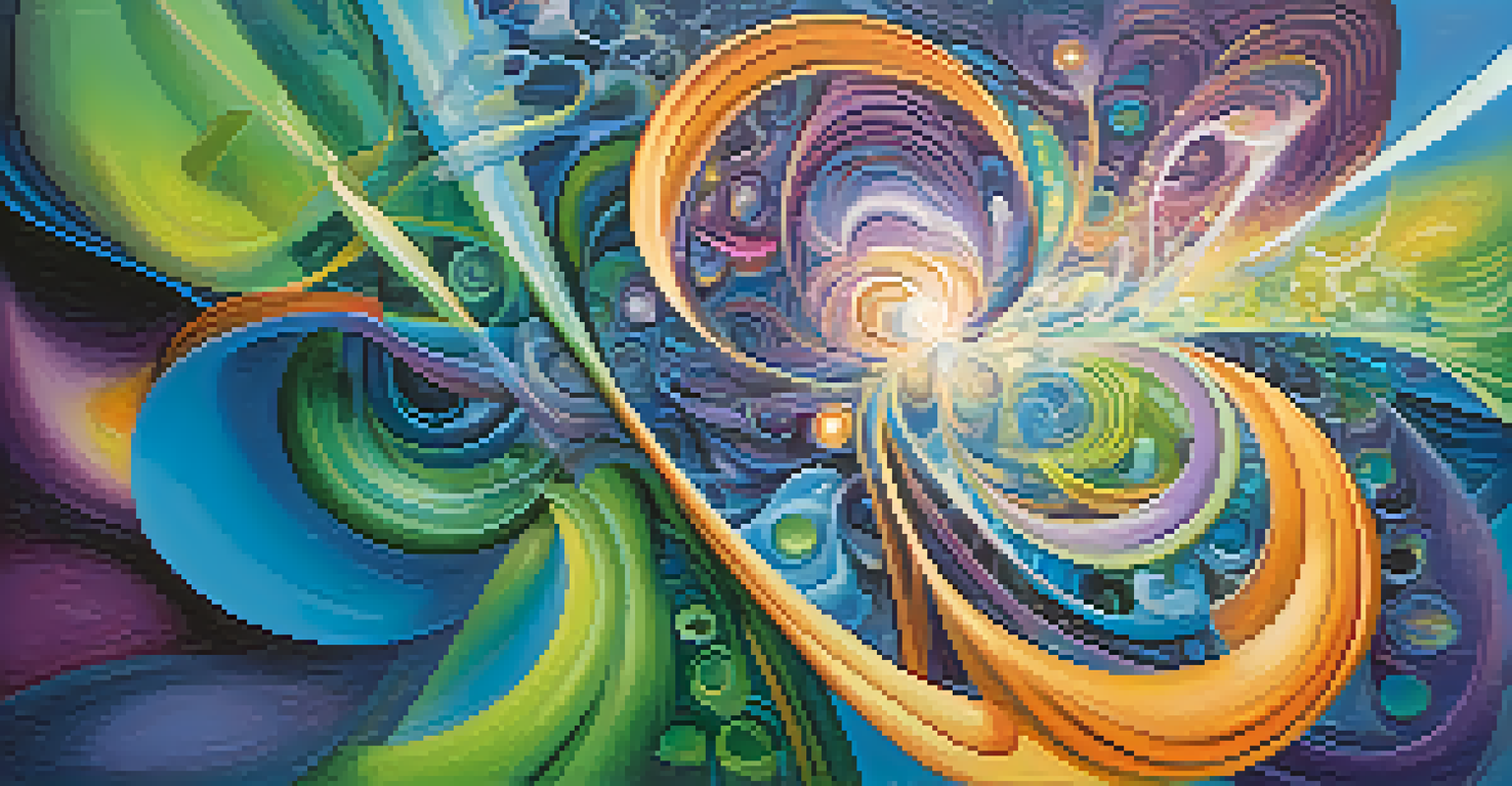How Hallucinogens Affect Trust in Interpersonal Relationships

Understanding Hallucinogens and Their Effects
Hallucinogens, such as LSD or psilocybin, are substances that alter perception, mood, and various cognitive processes. These effects can lead to profound changes in how individuals experience their surroundings and interact with others. For many, the use of hallucinogens can evoke feelings of interconnectedness and empathy, which may enhance relational dynamics.
The greatest gift you can give someone is your time, your attention, your love, and your concern.
The way these substances work involves altering serotonin receptors in the brain, leading to an expanded state of consciousness. This shift can make users feel more open and vulnerable, qualities that typically foster trust within relationships. Imagine a social gathering where everyone is sharing their deepest thoughts; this often happens during hallucinogenic experiences.
However, the impact on trust can vary significantly based on individual experiences and the context of use. While some may find a deeper connection with others, others might experience paranoia or anxiety, potentially undermining trust instead.
Trust: The Foundation of Relationships
Trust is often considered the cornerstone of any healthy relationship. It allows individuals to feel safe, valued, and understood, which in turn nurtures deeper connections. When trust is established, people are more likely to share their vulnerabilities and engage in open communication.

In a relationship without trust, misunderstandings can lead to conflict and disconnection. Think about a time when you felt betrayed or let down; that feeling can linger and affect future interactions. Establishing trust often takes time and consistent effort, but it can be easily shattered.
Hallucinogens and Trust Dynamics
Hallucinogens can enhance or undermine trust in relationships, depending on individual experiences and context.
Hallucinogens can disrupt this delicate balance. On one hand, they may create moments of bonding; on the other, they can also lead to distorted perceptions or misinterpretations of intentions, which may challenge the foundational trust.
How Hallucinogens Can Enhance Trust
When used in a safe and supportive environment, hallucinogens can foster a sense of unity and understanding among users. This shared experience can lead to deeper conversations and emotional revelations that enhance trust. For example, friends who share a hallucinogenic journey may find themselves discussing fears and aspirations that they hadn't previously addressed.
Trust is built with consistency.
The increased openness can create a bond that feels almost unbreakable, as individuals feel seen and heard in ways that are often rare in everyday interactions. This phenomenon is sometimes referred to as 'bonding through vulnerability,' where shared experiences can significantly elevate relational trust.
Moreover, the introspective nature of these experiences might lead users to recognize their own emotional barriers, allowing them to approach others with greater empathy and understanding. This shift can be transformative for relationships, paving the way for deeper trust.
Potential Risks: Trust Erosion Through Hallucinogens
While there can be positive effects, there are also significant risks associated with hallucinogen use, particularly regarding trust. Not everyone reacts the same way; some people may experience paranoia or anxiety, leading to distrust in themselves and others. This can create a rift in interpersonal relationships, as individuals may withdraw or misinterpret others' actions.
For instance, if someone feels threatened or anxious during a trip, they might misread a friend's supportive gestures as intrusive or judgmental. This misunderstanding can lead to a breakdown in communication and trust, even among long-standing friends.
Set and Setting Influence Trust
The mindset and environment in which hallucinogens are used significantly affect the trust dynamics among users.
Additionally, the influence of hallucinogens can sometimes lead to impulsive decisions that, once the substance wears off, can be regrettable. These decisions may further erode trust and complicate relationships, creating a cycle that can be difficult to break.
The Role of Set and Setting in Trust
The concept of 'set and setting' refers to the mindset of the user and the physical environment in which hallucinogens are taken. These factors play a crucial role in shaping the experience and can heavily influence the trust dynamics in interpersonal relationships. A supportive, familiar setting can enhance feelings of safety and trust, while a chaotic or unfamiliar environment may lead to discomfort and mistrust.
For example, friends who decide to share a hallucinogenic experience in a serene natural setting may find their bonds strengthened, as they feel safe and connected to each other. In contrast, if the same individuals were in a crowded, noisy party, their trust may be challenged by the surrounding distractions and potential misunderstandings.
Thus, creating a positive set and setting can enhance the potential for trust-building experiences while reducing the likelihood of negative outcomes. This careful consideration can make a world of difference in how trust is affected during hallucinogenic use.
Therapeutic Uses and Trust Building
In recent years, there has been a growing interest in the therapeutic applications of hallucinogens, particularly in treating issues related to trust and relationships. Studies suggest that when used under professional supervision, these substances can facilitate breakthroughs in communication and emotional understanding. This potential for healing can be particularly beneficial in therapeutic settings, such as couples therapy.
In these controlled environments, hallucinogens may help individuals confront deeply rooted issues and foster empathy for their partners. For instance, a couple undergoing therapy might explore feelings of betrayal or disappointment in a way that allows them to rebuild trust and connection. By addressing these emotions while under the influence, they can emerge with a newfound understanding of each other.
Therapeutic Potential for Rebuilding
Under professional supervision, hallucinogens can facilitate emotional breakthroughs that help rebuild trust in relationships.
As research continues to evolve, the implications for trust in relationships remain significant. The therapeutic context presents a unique opportunity to harness the benefits of hallucinogens while minimizing the risks associated with their use.
Navigating Trust After Hallucinogen Use
After experiencing hallucinogens, individuals often need to navigate the aftermath, especially concerning trust. Conversations about the experience can be crucial for understanding how it impacted relationships. Sharing insights and feelings can help clarify any misunderstandings that may have arisen during the experience.
It’s essential to approach these discussions with openness and patience, as not everyone may process their experiences in the same way. For example, one person might feel a deepened connection, while another might have felt vulnerable or exposed. Acknowledging these differences can help rebuild trust and foster a more robust relationship moving forward.

Ultimately, the journey of navigating trust after hallucinogen use can lead to deeper connections, provided both parties are willing to communicate openly and work through any challenges that may have surfaced.